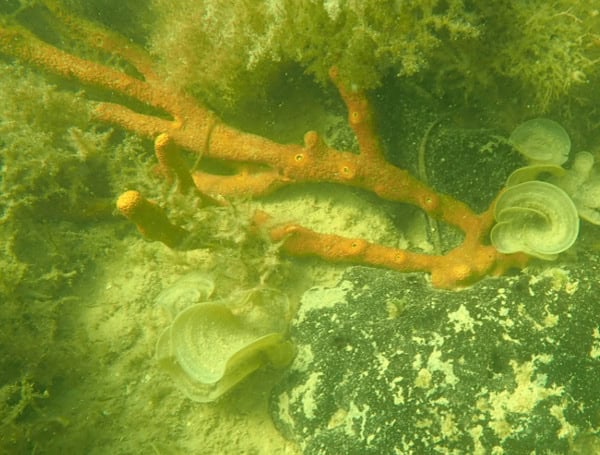2. A sheepswool sponge, an orange branching sponge and a starlet coral off the coast of Hernando County. Courtesy, Josh Patterson, UF/IFAS The wor

The world’s oceans absorb about 30% of carbon dioxide in the atmosphere, which does not bode well for Florida’s 825 miles of coastline.
Carbon dioxide can contribute to ocean acidification — a reduction in the pH of the ocean — which puts some forms of marine life such as oysters, clams sea urchins and corals in peril.
In a series of Ask IFAS documents, University of Florida experts explain how seawater chemistry changes as a result of elevated carbon dioxide levels. UF/IFAS Extension agents and scientists also outline how acidification can harm Florida’s marine life.
Read: UF/IFAS Florida-Friendly Landscaping Launches New Award: Natural Recognition
“Ocean acidification is an invisible, but real threat to Florida’s coastal and marine ecosystems, the impacts of which often amplify other threats such as water pollution, increased water temperatures and diseases or pathogens,” said Lisa Krimsky, water resources regional specialized Extension agent for Southeast Florida.
“However, it’s important to note that ocean acidification is not likely to impact all marine habitats and organisms in the same way,” said Krimsky, also a Florida Sea Grant agent. “Understanding these differences is necessary for successful management, protection and restoration of coastal and marine ecosystems.”
Marine habitats such as Florida’s coral reef are valuable, ecologically and economically. The reef supports fish and shoreline protection.
It’s also essential to the ecotourism industry. According to the Florida Keys National Marine Sanctuary, coral reefs in southeast Florida have a total economic value of about $8.5 billion. The estimated commercial value of fisheries with coral reef systems is over $100 million.
Read: Agricultural Safety Center, UF/IFAS Release Heat-Related Illness Toolkit
Therefore, UF/IFAS experts say it’s imperative to consider the effects of ocean acidification on sponges and stony corals because the interaction between these two groups may be altered.
In the most recent Ask IFAS document on ocean acidification, UF/IFAS scientists and Extension agents outline the potential danger it can inflict on sponges.
Early data suggest calcareous and siliceous sponges may be resistant or at least less susceptible to decreasing pH. But the data are incomplete, said Josh Patterson, a UF/IFAS associate professor of restoration aquaculture at the Florida Aquarium in Apollo Beach.
“There is not a lot of data available on how ocean acidification might affect sponges, but the information we have suggests they may be less affected than other forms of marine life with whom they compete for space and resources,” Patterson said.
But that doesn’t attenuate his concern for the potential damage ocean acidification could cause to sponges or the overall marine ecosystem.
When carbon dioxide mixes with water, it forms a weak chemical called carbonic acid. So much carbon dioxide has been emitted by human activity that it has decreased the pH of the oceans, and the trend will continue with further emissions, said Patterson, a faculty member in the School of Forest, Fisheries, and Geomatics Sciences.
There’s only one thing to do to lower ocean acidification, he said.
“The primary call to action is to decrease carbon dioxide emissions,” Patterson said. “We restore corals and sponges, but I don’t believe that action addresses ocean acidification.”
Help support the Tampa Free Press by making any small donation by clicking here.
Android Users, Click To Download The Tampa Free Press App And Never Miss A Story. Follow Us On Facebook and Twitter. Sign up for our free newsletter.
